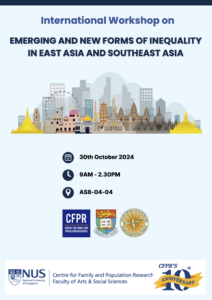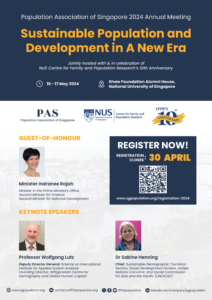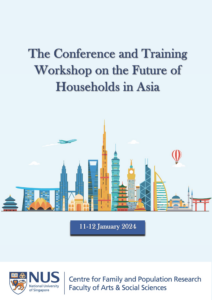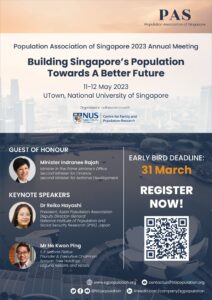Conferences
CFPR Conferences
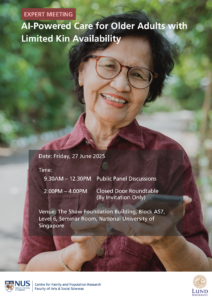 |
Date: 27 June 2025 Timing: 9am to 2pm Venue: AS7, Level 6, Seminar Room, Faculty of Social Sciences, NUS
|
 |
De-institutionalisation of Asian Families Venue: National Taiwan University (NTU) Date: 11–12 June 2025 |
 |
Date: 6-7 February 2025 Venue: AS7, Faculty of Social Sciences, NUS
|
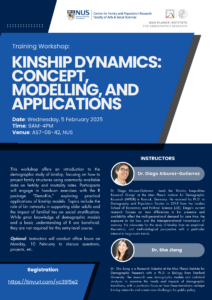 |
Kinship Dynamics: Concept, Modelling, and Applications Date: Wednesday, 5 February 2025 |
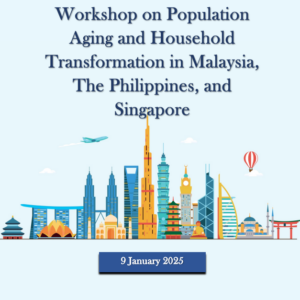 |
Date: 9 January 2025 Venue: AS7, Faculty of Social Sciences, NUS |
|
|
The International Workshop on "Emerging and New Forms of Inequality in East Asia and Southeast Asia" Date: 30 October 2024 Venue: AS8, Faculty of Social Sciences, NUS |
|
|
Conference Theme: "Sustainable Population and Development in a New Era". Date: 16-17 May 2024 Venue: NUS Shaw Foundation Alumni House More Details: https://www.sgpopulation.org/pas-2024 |
|
|
Date: 11-12 Jan 2024 Venue: NUS FASS |
|
|
Population Association of Singapore 2023 Annual Meeting Convenors: Jointly organized by the NUS Centre for Family and Population Research (CFPR) and the Population Association of Singapore (PAS) Date: 11-12 May 2023 Venue: NUS University Town |
|
The Forum on Priorities on Population Research in Singapore Convenors: Jointly organized by the NUS Centre for Family and Population Research (CFPR) and the Population Association of Singapore (PAS) Organizing Committee members: A/P Bussarawan Teerawichitchainan, A/P Vincent Chua, Prof Paul Cheung, Dr. Yap Mui Teng, Dr. Tan Poh Lin, and Prof Jean Yeung Date: March 31, 2022 Time: 10:30-12:20am Venue: NUS University Hall Auditorium Format: a hybrid meeting, max capacity is 124 ppl., with virtual attendance through zoom option available |
|
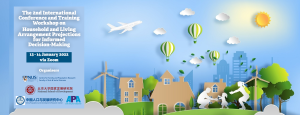 |
The Centre for Family and Population Research (CFPR) at the National University of Singapore (NUS) held the the 2nd International Conference and Training Workshop on Household and Living Arrangement Projections for Informed Decision-Making on 13-14 January 2022, via Zoom. This was in collaboration with Population Division of the United Nations (UNPD), Asian Population Association (APA), Center for Healthy Aging and Development Study, National School of Development (CHADS/NSD) at Peking University (PKU), China Population and Development Research Centre (CPDRC) and Population Association of Singapore (PAS). The 1st International Conference and Training Workshop on Household and Living Arrangement Projections for Informed Decision-Making was held on May 9-11, 2019 in Beijing, jointly organized by CPDRC, CHADS/NSD at PKU, and CFPR at NUS. View Recordings Here |
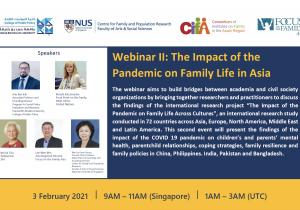 3 February 2021: Webinar II - The Impact of the Pandemic on Family Life in Asia
3 February 2021: Webinar II - The Impact of the Pandemic on Family Life in Asia
This event they present their findings on the impact of the COVID-19 pandemic on children’s and parents’ mental health, parent-child relationships, coping strategies, family resilience and family policies in China, Philippines, India, Pakistan and Bangladesh.
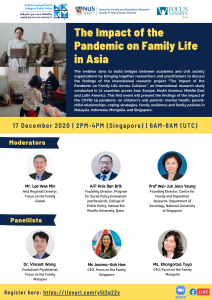
17 December 2020: The Impact of the Pandemic on Family Life in Asia
CFPR and the College of Public Policy, Hamad Bin Khalifa University co-organized the webinar on 17 December 2020 at 2pm to 4pm (SGT). The webinar brought together researchers and practitioners to discuss the findings of the international research project “The Impact of the Pandemic on Family Life Across Cultures", an international research study conducted in 72 countries across Asia, Europe, North America, Middle East and Latin America. They discussed the impact of the COVID-19 pandemic on children’s and parents’ mental health, parent-child relationships, coping strategies, family resilience and family policies in Malaysia, Indonesia, Mongolia, and Singapore.
 10 December 2020: Financial Adequacy among Older People in Selected Asian Countries
10 December 2020: Financial Adequacy among Older People in Selected Asian Countries
Asian Population Association and NUS CFPR are hosted a webinar on 10 December 2020, 2.00pm to 3.30pm (SGT). This webinar examined some issues related to the question: "With deteriorating marketable skill, weakening health, disappearing filial piety, and limited government support, what is the prospect on living with dignity among Older People?"
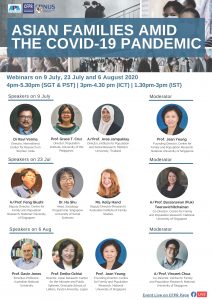 9 July, 23 July and 6 August 2020: Asian Families Amid the Covid-19 Pandemic
9 July, 23 July and 6 August 2020: Asian Families Amid the Covid-19 Pandemic
Asian Population Association and NUS CFPR are hosting 3 webinars on 9 July, 23 July and 6 August 2020, 4.00pm to 5.30pm (SGT). The COVID-19 pandemic has exerted unprecedented pressure on many institutions including the health care systems, schools, government, markets, and law. Family, as the basic socioeconomic unit of the society, bears the brunt of the multiple stressors caused by the disruptions to these institutions. The webinars will explore the impact of COVID-19 on families in Asia-Pacific region focusing on the vulnerabilities of women, children, and older adults as they experience morbidity, mortality, migration, economic recession, and school closure.
Recording of Webinar on 9 July
Recording of Webinar on 23 July
Recording of Webinar on 6 August
21-22 November 2019: Family Policies in Asia
(co-organized by the Asia Research Institute's Changing Family Cluster)
18 October 2019: Changing (In)Fertilities in Asia and Beyond
(jointly organized by Yale-NUS College, Yale University and the University of Cambridge)
17-19 May 2018 - RC06 (Family) & RC41 (Population)
(co-organized with Global Asia Institute and Department of Sociology; sponsored by OUE Limited and Faculty of Arts and Social Sciences)
- Keynote Speech - Family and Demographic Change: Problems and Progress with examples in Singapore and USA
- Keynote Speech - Population and Climate Change: Sustainable Development through higher mitigative and adaptive capacity to environmental change
- A U-shape Cohort effect on gender norms in Japan
- Young adults in non-regular employment and unemployed have less desire to marry soon
- Rural Chinese migrant wives’ economic and housework contribution explains left-behind husband’s happiness
- Women in conflict areas more likely to use modern contraception
- Asset poor more likely to fall into structural and persistent poverty over time
- Increasingly passive attitude in Chinese women’s fertility intentions
- Migrant Indian girls’ disadvantages ameliorated by living in extended families
- Muslim youths and west Asian groups at higher risk of unemployment in Canada
- Older Singaporeans becoming homeless as resources run out
- “Maternal gatekeeping” and conformity to “Ideal Muslim” marital couple persists among Malay families
- Couples in Living Apart Together relationships (LAT) view it as signal of high relationship commitment
- Russian women married to Asian men perceived as “strangers”; restrict extent of marriage migration
- China’s college expansion and global integration reduced millennials’ chances to skilled jobs
- Cross-border couples at higher risk of husband-to-wife sexual coercion
- Proportion of China’s population identifying as ethnic minorities rose by 61 percent
- Caregiving challenges of low-income caregivers of dependent seniors
- 'Egalitarian island' couples result in economically efficient divisions of childcare
- Developed societies do not “age” with senior cohort
- Japan’s parental leave system not benefiting women with non-regular employment
- Later life health impacted by childhood exposure to parental smoking and missing school due to health problems
- Unclean, untidy residential environmental negatively affects older adults' physical health and cognition
- Transitions and relationship dynamics within stepfamilies in Singapore
- Hiring domestic helper increases married women’s working hours
- Women are disadvantaged in re-partnering in traditional contexts
- Elderly living in disadvantaged neighborhoods have strong social interaction and social cohesion
- Siblings effect positively impacts academic performance
- Early nutrition benefits children’s cognitive development in India, especially for girls
- Non-normative living arrangements are more preferred despite patrilineal tradition in Japan
- Breadwinning wives having more health related issues
- Having more liquid assets may facilitate fertility decline
19 January 2017 - Distinguished Public Lecture on Family and Population
The Centre, together with NUS Global Asia Institute, organized a Distinguished Public Lecture on Family and Population that focused on Postindustrial Low Fertility in Europe and East Asia: Lessons for Singapore. More than 140 academics, researchers, students, staff from government agencies, and the public attended the lecture which featured our Distinguished Speaker Professor Mary Brinton, Reischauer Institute Professor of Sociology, Department of Sociology, Harvard University. The Guest-of-Honour for the event was Senior Minister of State Mrs Josephine Teo, Prime Minister's Office, Ministry of Foreign Affairs, Ministry of Transport, Republic of Singapore. The event was opened with a welcome speech by Professor Ho Teck Hua, Deputy President (Research & Technology) and Tan Chin Tuan Centennial Professor. Moderated by Professor Jean Yeung, a dialogue with Mrs Josephine Teo and Professor Brinton followed the latter's presentation. Other special guests included Dr Stephen Riady, Executive Chairman of OUE Ltd and Ms Laurence Bernardi, First Secretary, French Embassy.


